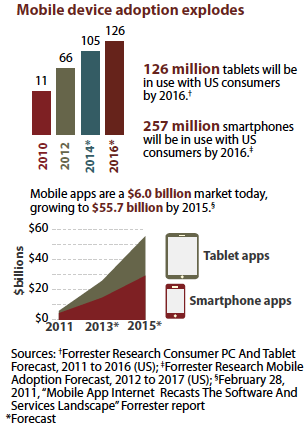One billion smartphones by 2016, says Forrester

In a world where already you cannot travel on the subway without someone flipping out their cellphone, or stand at a Starbucks without someone yapping away on their iPhone, imagine what'll happen with 1 billion smartphones out there?
Forrester seems to think so. Analysts at Forrester believe that by 2016 --- only four years away, and in time for the following Olympics --- there could be as many as 1 billion smartphones on the planet. This isn't to say that everyone will have two or more smartphones, that is.

- There will be one billion consumers using smartphones, and 350 million of those will be used for work. Over half of that figure will bring their own devices to work.
- Mobile spending will reach $1.3 trillion and consumer spending in the mobile application store market will reach $55 billion.
- Apple, Google, and Microsoft will be the platform used by over 90 percent of smartphones and tablets worldwide.
- Business spending on mobile projects will double in growth.
In the report, it highlights that mobile apps are the "face of new systems," and act as a "flash point" for more holistic and far-reaching change. Too many people think that mobiles and smartphones are simply another device to keep you connected to the things you are working on.
But in four years time, the possibilities for mobile growth are close to endless. Real-time decisions can be made by consumers and businesses alike from their very handsets. Mobile collaboration and productivity tools mean one can leave laptops at home and PCs in the office, and work from the devices they carry around in their pockets.
With this, however, comes its own logistical problems of IT security and the bolstering of back-end infrastructure. Companies will need to evaluate how to contend with the ongoing battle of user privacy and data protection, and to ensure that systems can guarantee uptime during spikes of consumer and business activity.
Perhaps by 2016, the mobile operators will be able to cope with the vast amount of traffic flowing across its networks. Smartphones are only half of the issue Networks need to speed up next-generation technologies to allow greater speeds while decreasing the pressure on its back-end systems.
Image source: Forrester.